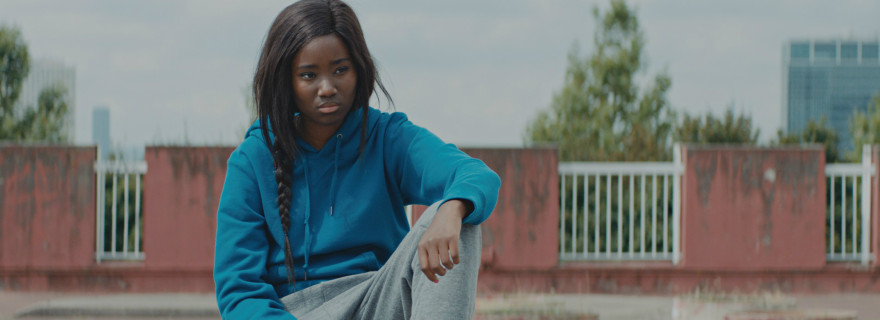'Girlhood'
Movie Rating:
3
Céline Sciamma’s latest feature was retitled ‘Girlhood’ for its North American release specifically to capitalize on the popularity of that award-winning Richard Linklater movie that you might have heard about. In a way, it’s an irritating marketing decision that draws comparison between films that aren’t really comparable. In another way, it actually prepares viewers for the delicate social observation and lack of conventional structure that Sciamma employs in this touching, tiny movie. It’s a strong piece, just don’t expect ‘Boyhood’. But be prepared for a similar experience… if that makes sense.
The film’s original French title was ‘Bande de filles’, which roughly translates to ‘Girl Gang’, and that feels far more appropriate once you actually watch the movie. Karidja Touré stars as Marieme, a football playing girl jock without much of an identity or hope. He mother works as a cleaner and is rarely home (and therefore rarely in the movie), leading to Marieme essentially raising her young sister while her abusive brother raises her. It’s a tough life in the projects that brings little happiness until Marieme finds herself joining up with a gang of girls led by the imposing Lady (Assa Sylla). They intimidate and beat up kids for money, laugh incessantly, and in one particularly well-staged scene use stolen cash to rent a hotel room and lip-synch along to a Rihanna song in its entirety. Writer/director Sciamma never makes the characters’ actions seem right or even acceptable, but revels in the camaraderie long enough to show how important friends can be, even when they’re the wrong friends.
Eventually, Marieme grows away from Lady and her gang and finds a new identity and escape by working for a local drug dealer. This obviously proves to be a not particularly wise decision, and leads to Marieme assuming a new identity and even hiding her sexuality to fit in with the new clique. That raises all sorts of questions and themes, but Sciamma wisely never gets too preachy or didactic in her approach to the material. ‘Girlhood’ is very clearly a movie that bites off big themes and attempts to give voice to a voiceless underclass in France, yet never for the sake of daring to over-explain those lives or that world.
Instead, Sciamma merely observes and explores, treating her camera like a window into an unseen world. She’s not above staging a stylish cinematic sequence and indeed shoots in Cinemascope with flowing camera moves to heighten the experience as much as possible. Yet what happens within those frames admirably never feels as heightened as the cinematic style. The performances (mostly from teens making their movie debuts) have a reserved naturalism that suits the material well. The movie feels like life rather than a constructed narrative, and the audience gets the sense of having lived with these people by the time the credits roll.
Unfortunately, the filmmakers’ commitment to social observation over story structure can be the movie’s undoing as much as its greatest strength. The morally and narratively ambiguous approach that Sciamma employs can often be as frustrating as it is enthralling. It’s difficult to tell what her point-of-view on the material might be, or exactly what the point of the whole film is by the time the credits roll. It’s even harder to tell who exactly Marieme is after all of her image swaps.
Perhaps these are questions that we’re supposed to mull over without answers, but they make the movie feel a bit unsatisfying. Still, simply getting a film this intriguing about a world this rarely explored is worth any lingering frustrations. Céline Sciamma has certainly delivered something worth watching in ‘Girlhood’, even if it’s not always clear why that’s the case.



